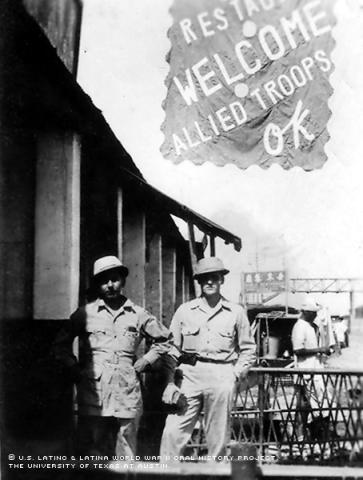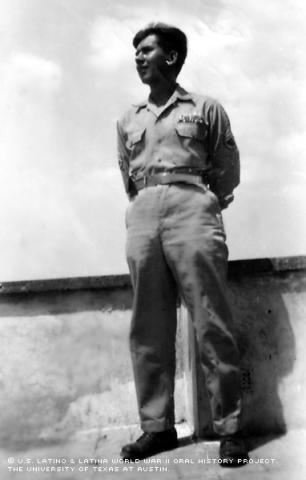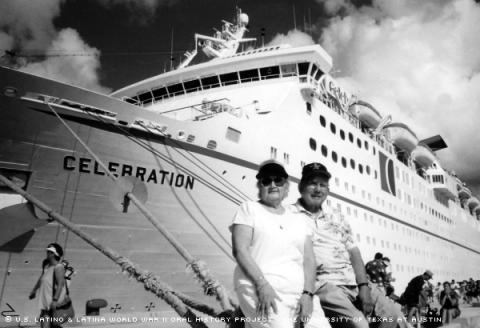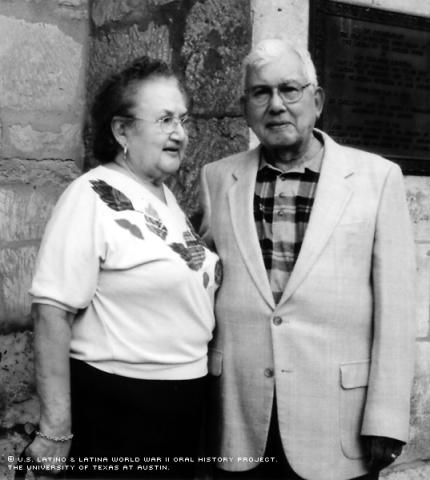



By Elizabeth Egeland
Paul Solis and his two brothers all served in World War II. He was in the China- Burma-India Theater; his older brother, Raymond, worked on dry docks in the Pacific; and his younger brother, August, served on the USS Farragut (DD 348). All returned safely.
For Solis, the war would be his chance to break away from his life in Houston, to hitchhike across America and see parts of the world he probably never would have had the chance to visit. It made him appreciate what he had back home.
"From going all around the world and seeing all these other countries, there's no place like the United States," Solis said.
When he first heard about the attack on Pearl Harbor, he says he didn't know if what was happening was real.
It was a Sunday, and Solis was in downtown Houston at a restaurant where his brother Raymond tended bar. Everything was quiet and normal until he heard the announcement that would change his life.
"It came over the radio, and at first I thought it was a joke," said Solis, now an 83-year-old resident of Houston. "You didn't know whether to take it seriously or cry or do what."
It was Dec. 7, 1941, and the patrons of Kelly's had just learned of the Japanese attack on Pearl Harbor. The news was life-changing for the 22-year-old waiter, as it inspired him and his brothers to enlist in the military and defend their country.
"We said, 'Well, we've got to go and see what we can do about it, about enlisting,'" Solis said. "And so everybody you met was going to enlist."
Solis was born in Victoria, Texas, on August 23, 1919, and spent most of his life in the Victoria and Houston areas. In 1933, his father died, apparently of cancer, making life difficult for his mother, two brothers and two sisters. He first attended school in Houston, then went to high school in Victoria, but was forced to drop out after the 11th grade to help provide for his family.
"I took turns as a clerk in a store, and I worked at Foley's for a few months," Solis said. "But most of the time I was a waiter, and I liked that."
When he was 18, Solis was about to be drafted but was deferred because he was supporting his mother. It wasn't until after the attack on Pearl Harbor that he contemplated joining the military.
In December of 1941, he went down to the recruiting office, but was told to wait a month before actually enlisting.
"They told me, 'You better stay here for Christmas, because you might not see another one,'" he recalled.
Solis’ brothers joined the Navy and tried to persuade him to join them. But he decided to join the Army Air Force instead. He was inducted into the service and went to Fort Sam Houston in San Antonio, where the military processed the troops and decided where their next destination would be.
"They didn't even check on your background or your education or nothing," Solis said. "So they sent us to Sheppard Air Force Base [near Wichita Falls, Texas] ... and we had boot training there, basic training, and we were there about three months drilling eight hours a day."
Solis says the soldiers were so tired after the training that they wouldn't even participate in one of their favorite pastimes: playing baseball.
"They said, 'Come on, I'll let you play ball now. You've been working really hard,'" Solis said. "Nobody wanted to play ball; you couldn't even run to first base."
After training, Solis was sent to Scottfield, Ill., for radio school training, then was asked to report to a base in Massachusetts.
"They gave us $50 for travel expenses and food for two weeks,” said Solis, who also noted that they saved money by hitchhiking.
He and another soldier made many stops along the way, visiting Washington, D.C., and Philadelphia, among other cities.
"We stopped in town to eat, and it took us about three days to get there," Solis said. "We had 10 days to get there, so we weren't in a hurry. We met a lot of nice people."
In March of 1942, Solis and his outfit were shipped to Liverpool, England, where they were finally deployed to their first mission in North Africa, where he and his unit stayed for about a year. In his three years and 10 months in the military, Solis served in the 10th and 12th Air Force, with the 18th Troop Carrier Squadron (C-47). His unit served in many countries, including North Africa, Italy, France and the CBI, or China- Burma-India Theater.
Solis' squadron had about 28 airplanes, each of which had a flight crew of five and ground crews that helped maintain the aircraft. In addition, cooks, officers and mechanics were part of the squadron, which Solis says totaled about 300 people.
Flying in a C-47, Solis and his unit would drop supplies to the troops on the front lines, on which he says he was fortunate not to be.
"Air Force was a lot different than the front line," he said. "We went to bed with some clean sheets most of the time. Took a shower and ate a meal before we went to bed."
But Solis and his unit were still faced with some close calls.
During an invasion in Sicily, he and his squadron were flying low formations above the British and U.S. navies.
"They thought we were the Germans," Solis said. "They started firing at us ... they knocked down about three or four of our gliders and one plane."
On Sept. 2, 1945, Solis was discharged after earning the rank of Staff Sergeant and being awarded the Distinguished Flying Cross, which he earned for flying 151 sorties over combat areas. He also received the Asiatic-Pacific Campaign Medal with one Bronze Star, the EAME Campaign Medal with four Bronze Stars, an Air Medal with Oak Leaf Clusters and a Good Conduct Medal.
Solis went home to Houston. Within a few months, his brothers and some cousins also returned safely.
Solis worked as a manager of a restaurant and a waiter, but says he "couldn't make up my mind what I wanted to do."
"Back in those days, if you had a high school education, it's like having four years college now. But I didn't even have that. I just had eleventh [grade]," Solis said.
He attended the University of Houston for two years before transferring to a vocational school, Feather and Feather Art. He earned a commercial art degree but didn't apply it to his career. Instead, he worked for the U.S. Postal Service for 34 years.
Solis says he didn't work in art because he "got married and needed immediate income."
Two years after leaving the service, he married Emma Torres, a native Houstonite. The couple had three children -- two boys and a girl -- and still live in Houston.
Solis says he's proud of what he has accomplished in life and the time he spent serving his country.
"I feel that I got more than I deserved, and I think if I had a better education to start out with, I would have done a lot better.
"I'm 86 years old, and I've lived a good life. A lot of people I grew up with are not around anymore, so I figure I did something right."
Mr. Solis was interviewed in Houston, Texas, on January 22, 2003, by Paul R. Zepeda and Ernest Eguia.

